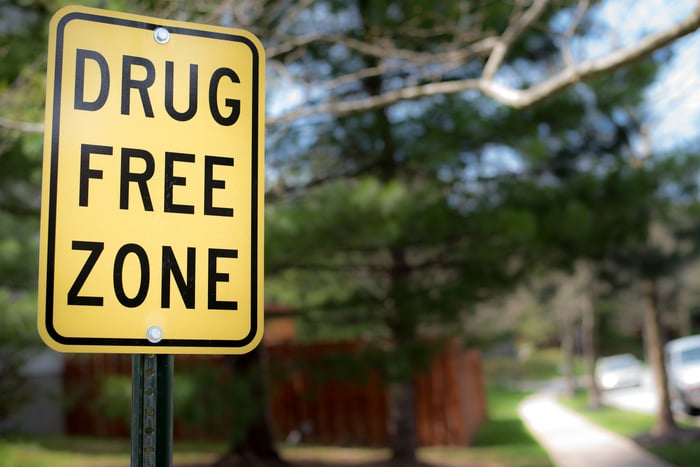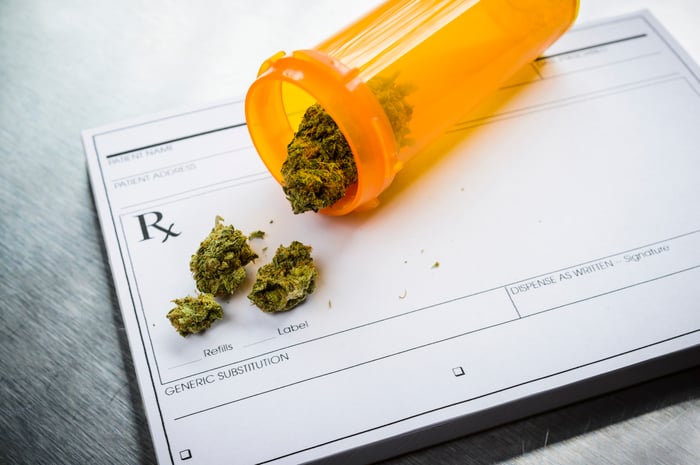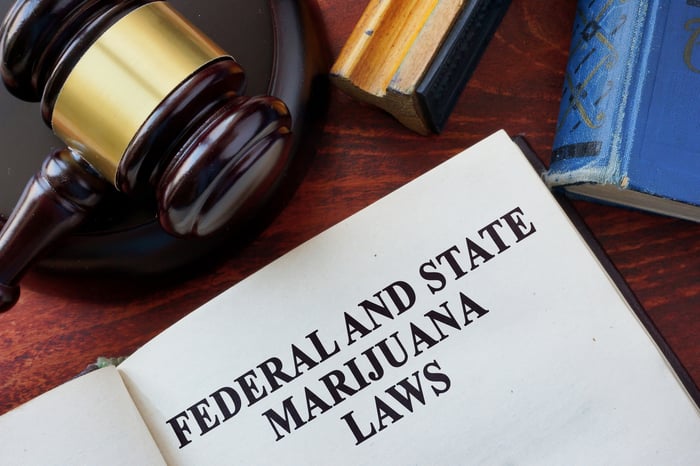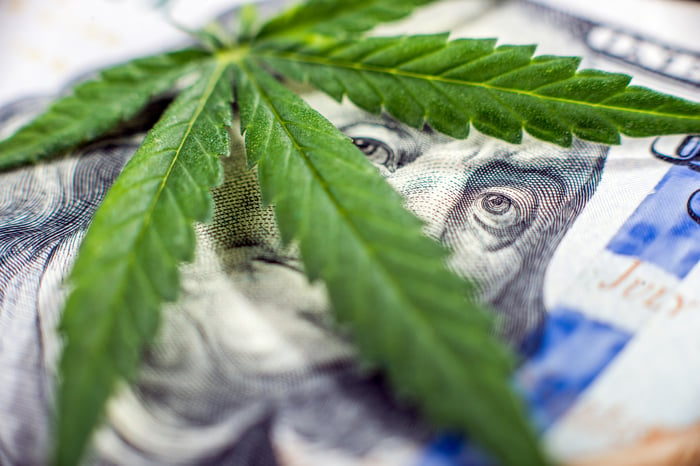Tonight is the night we've all been waiting for: midterm elections.
Voters across America have gone to the polls to decide the make-up of Congress for the next two years of Donald Trump's presidency. Ultimately, tonight's elections will almost certainly decide the path of fiscal policy, healthcare, infrastructure, and trade in the near future.
However, midterm elections also mean there's plenty at stake at the state level. In particular, the U.S. cannabis movement had been hoping for a "green sweep" in the four states -- Michigan, North Dakota, Utah, and Missouri -- that were voting on marijuana initiatives. Let's take a closer look at how each of these initiatives fared in their respective states. Voting result data comes from The New York Times, as of 12:43 a.m. ET on Nov. 7, 2018.

Image source: Getty Images.
Michigan
Proposal 1: The recreational use and possession of marijuana would be legal for anyone 21 years old or older. A tax would be imposed on marijuana sales.
- Yes: 57.1%
- No: 42.9%
Arguably the biggest prize for cannabis enthusiasts tonight is Michigan's vote to legalize recreational marijuana. As a reminder, adult-use weed has already been approved in nine states, with sale of the drug OK in eight of those states (sorry, Vermonters).
Michigan's Marijuana Legalization Initiative, known better as Prop 1, allows adults aged 21 and over the right to purchase and possess marijuana. Michigan will impose a statewide excise tax of 10% on any recreational pot sales, with a majority of the revenue created by this tax being funneled to law enforcement, road and bridge maintenance, and the state's K-through-12 education system. As with most marijuana initiatives that have been passed in already legal states, Prop 1 allows municipalities within Michigan to ban or limit recreational cannabis dispensaries within their boundaries.
Michigan becomes the 10th state to OK recreational weed use.

Image source: Getty Images.
North Dakota
Measure 3: Recreational use of marijuana would be legalized for those 21 years old and older. An automatic expungement process would be established for convictions involving marijuana or any other controlled substance that has since been legalized.
- Yes: 40.8%
- No: 59.2%
Even though it's a relatively small market, the state of North Dakota was expected to help push the U.S. closer to having a quarter of all states recreationally legal. Instead, it bucked the evening's trend, with residents voting down the broad-based measure.
What made the Marijuana Legalization and Automatic Expungement Initiative (Measure 3) so intriguing was that not only did it aim to legalize recreational marijuana in the Peace Garden State, but it also would have gone a step further by expunging the records of people convicted of a drug violation in instances where that drug is now legal. In essence, if recreational marijuana had been legalized (i.e., decriminalized) in North Dakota, former convictions for cannabis were to be expunged. It would also have treated future violations, such as trying to sell cannabis to someone under the age of 21, the same as trying to sell alcohol to a minor.
North Dakota prevented the evening from being a true green sweep.

Image source: Getty Images.
Utah
Proposition 2: Medical use of marijuana would be legalized for people with qualifying illnesses.
- For: 54%
- Against: 46%
The idea of seeing a conservative state like Utah voting on medical cannabis might have been laughable even five years ago. However, with most polls showing national support for medical cannabis at around 90%, if not higher, this result isn't really that much of a surprise.
The Utah Medical Cannabis Act, or Proposition 2 as Utahans know it, requires qualifying patients to get a medical card from their physician. Once in possession of this medical card, they'll be allowed to purchase either 2 ounces of unprocessed marijuana or up to 10 grams of tetrahydrocannabinol (THC) or cannabidiol (CBD) within a two-week period. CBD is the non-psychoactive cannabinoid best known for its medical benefits, whereas THC is the cannabinoid that gets a user "high." It's worth noting that smoking or vaping cannabis won't be allowed with Proposition 2.
Utah becomes the 31st state to legalize medical marijuana in the United States.

Image source: Getty Images.
Missouri
Amendment 2: Marijuana would be legalized for medical purposes. A 4% tax would be imposed on marijuana sales, with the revenue dedicated to healthcare services for veterans.
- Yes: 65.3%
- No: 34.7%
Amendment 3: Marijuana would be legalized for medical purposes. A 15% tax would be imposed on marijuana sales, with the revenue dedicated to a Biomedical Research and Drug Development Institute.
- Yes: 31.2%
- No: 68.8%
Proposition C: Marijuana would be legalized for medical purposes. A 2% tax would be imposed on marijuana sales, with the revenue dedicated to veterans' services, drug treatment, education, and law enforcement.
- Yes: 43.2%
- No: 56.8%
No, that's not a mistake. Missouri really did put three separate medical cannabis initiatives on its ballot for voters.
While they all reach for the same end goal of legalizing medical marijuana, there are variances in the tax rates and where the collected revenue winds up. Amendment 3 passes along the highest tax rate but also has the most ambitious project: a biomedical center that would use the funding to conduct cancer research and focus on other currently incurable diseases. The other two proposals offered considerably lower tax rates. Not shockingly, the highest-tax proposal had the lowest support rate.
In the event that two or more proposals had secured enough votes to pass, the one with the highest percentage of "yes" votes would have been implemented. With only Amendment 2 passing, the choice was clear for Missouri voters.

Image source: Getty Images.
The big picture: Is federal legalization on the table?
As we move into the post-election environment, there are now 32 states (and Washington, D.C.) to have legalized medical cannabis in the U.S., along with 10 states (and Washington, D.C.) that have given the green light to recreational marijuana. This has all the makings of a genuine push to legalize marijuana in the United States.
This virtual green sweep that saw three out of four states pass at least one of their cannabis initiatives comes just a few weeks after national pollster Gallup released its latest findings on the public's perception of pot. In total, two out of three Americans (66%) now favor legalization, with Republicans and older Americans aged 55 and over, two groups that have historically opposed legalization, now in favor of giving cannabis the green light.
But will this lead to change at the federal level? Don't count on it.
For starters, even if Republicans have softened their stance, according to Gallup, it's unlikely that GOP lawmakers would willingly put cannabis reform on the docket. Likewise, President Trump has expressed concern about recreational cannabis use in the past and has preferred a wait-and-see approach. In other words, Republicans have no incentive to push the issue -- at least not right now.

Image source: Getty Images.
The bigger concern is money. You knew it would come down to money.
Right now, Section 280E of the U.S. tax code disallows U.S.-based marijuana businesses from taking normal corporate income tax deductions. With the exception of cost of goods sold, pot businesses could be paying an effective income tax rate of as much as 70% to 90%. This allows the federal government to collect a tidy sum from weed businesses operating in already legal states.
However, if marijuana were decriminalized at the federal level, it would no longer subject cannabis businesses to Section 280E. Doing so would cost the federal government billions over the next decade -- and, might I add, the federal government just posted its largest federal deficit ($779 billion) since 2012.
I know what you're probably thinking: "Add a federal excise tax on cannabis sales, and everything would be resolved." Unfortunately, it's not that easy. The more tax that's added, the more incentive consumers have to stick with black market producers rather than legal channels. No matter what is done, federal tax collection would be likely to fall with legalization. This makes legalization a tough pill to swallow at the federal level.

Image source: Getty Images.
High risk, high reward
So, what's this all mean on the investment front?
While it would provide clarity if the federal government were to reschedule or decriminalize marijuana entirely, Washington's hands-off approach has demonstrated that U.S.-focused businesses can thrive in the right markets (i.e., California or Florida). Of course, investing in U.S. businesses has been, and remains, a high-risk, high-reward venture.
For example, Origin House (ORHOF), formerly known as CannaRoyalty, appears to be in prime position to benefit as California's recreational weed industry blossoms. There are thousands of brands competing for shelf space in hundreds of licensed Californian dispensaries. But at the end of the day, there are only a small number of distributors licensed to move cannabis from Point A to Point B, and Origin House is one. Origin House has been gobbling up distributors in the Golden State to boost its share of the distribution market. Sure, the company has been hit in recent months by cannabis oversupply and red tape slowing the dispensary approval process. But, longer term, Origin House appears to have a very profitable niche secured.
My colleague Keith Speights has been particularly enthralled with Liberty Health Sciences (LHSIF) in Florida. Though a penny stock based on its share price, Liberty Health Sciences currently controls about 15% of Florida's medical weed market, and it's on track to expand that figure to between 20% and 25% very soon. The company is building a new facility that'll allow it to be the largest producer in the state, which'll be great if Florida ever moves to legalize recreational pot. But even if it doesn't, Florida's older population is perfect for Liberty Health Sciences medically focused production.
Tonight's cannabis vote, with the exception of the small-market state of North Dakota, signals that growth in the U.S. cannabis industry could just be getting started. And while there's plenty of built-in risk, the rewards for investors looking many years down the road could be bountiful.





